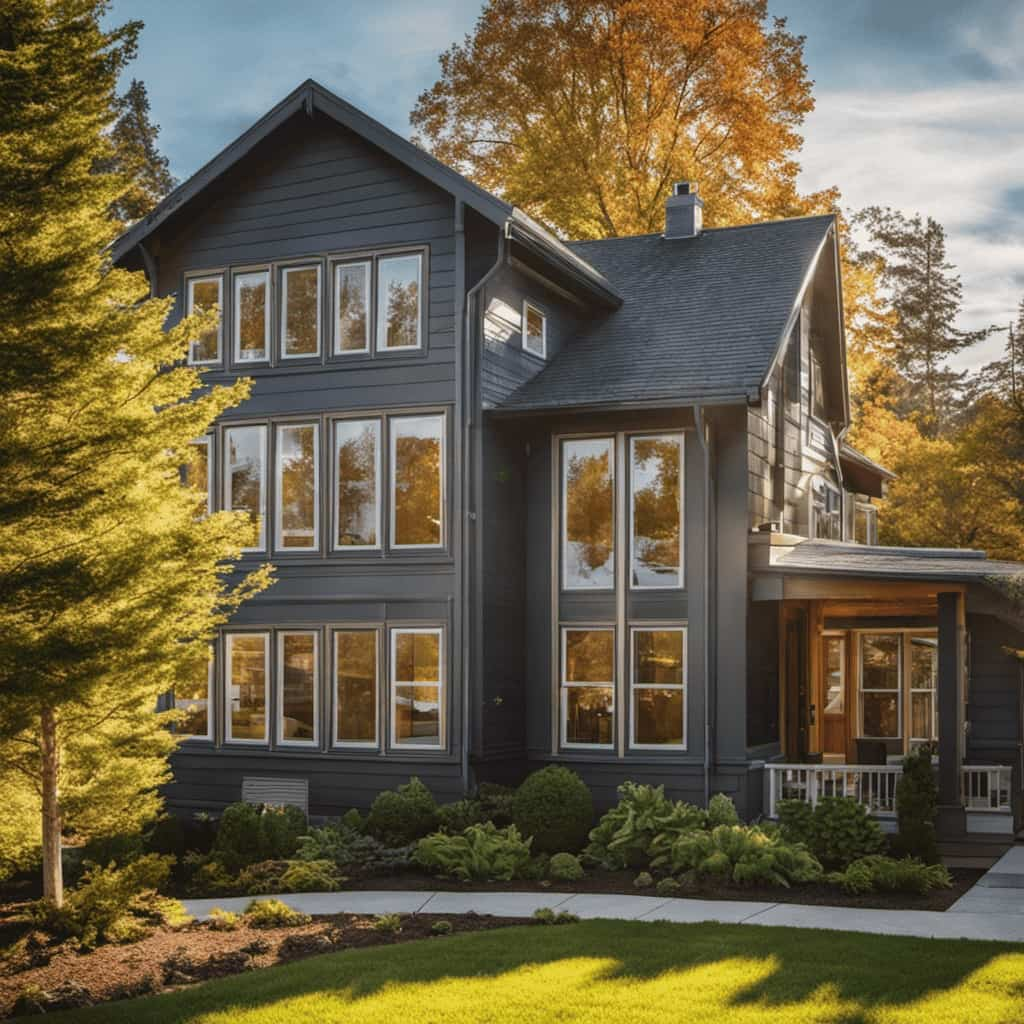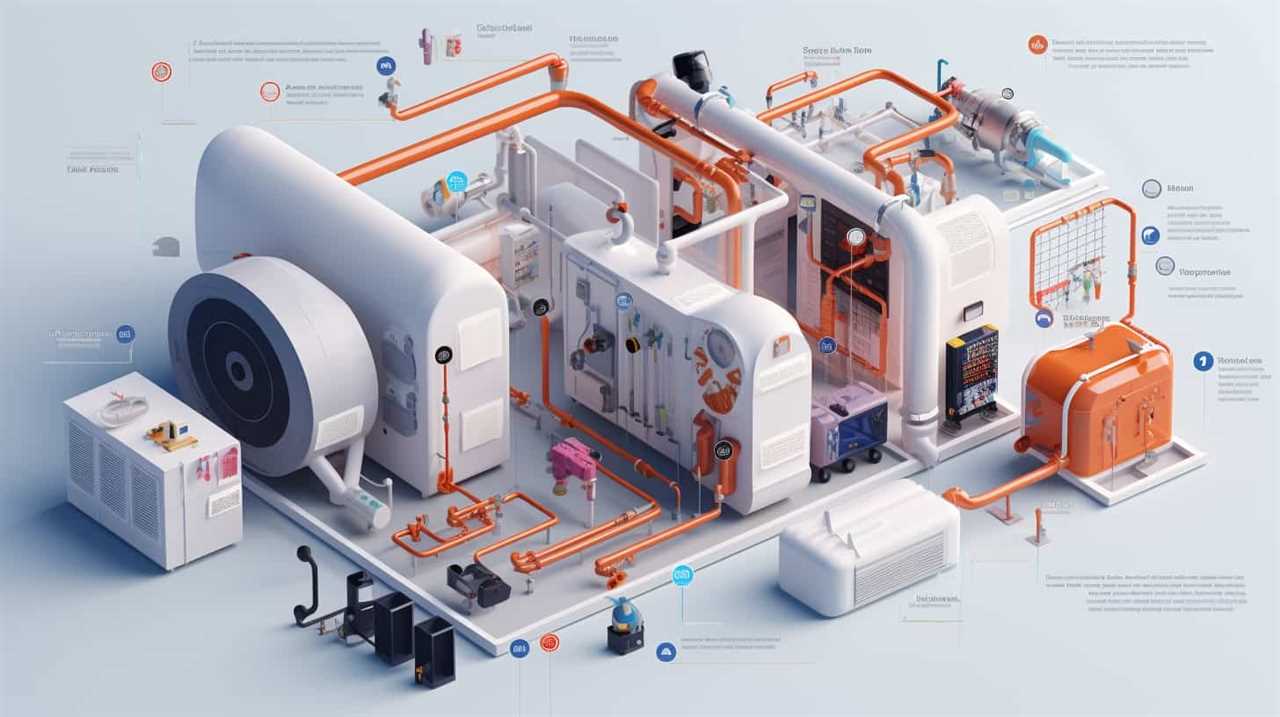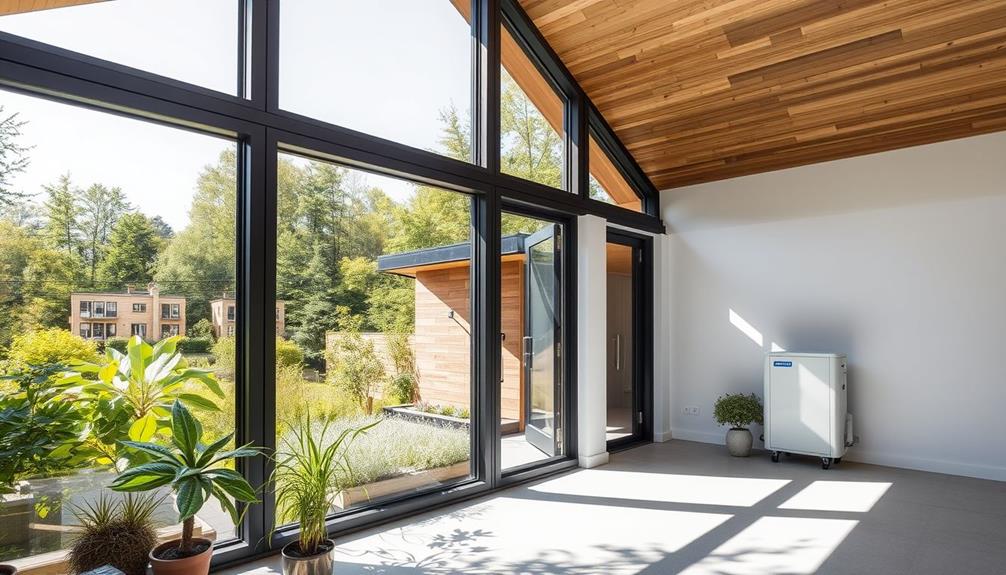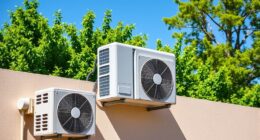You may be asking yourself, can a heat pump provide environmentally friendly heating options for your home? Without a doubt, the answer is a resounding yes!
In this article, we will explore the various heat pump options available to you, how they work, and the benefits they offer for a greener and more energy-efficient home.
Whether you’re considering a heat pump for the first time or looking to upgrade your current system, we’ve got all the information you need to make an informed decision.
Key Takeaways
- Heat pumps extract heat from the air or ground and transfer it into your home, providing both heating and cooling options.
- Different types of heat pumps, such as air source, ground source, water source, and hybrid, offer varying efficiency, cost, and environmental benefits.
- Ground source and water source heat pumps generally have higher Coefficient of Performance (COP) values, resulting in lower energy consumption and better performance.
- Heat pumps are an energy-efficient and environmentally friendly option for sustainable home heating, offering significant energy savings, reduced utility bills, and the ability to be powered by renewable energy sources.
How Do Heat Pumps Work
Let’s start by understanding how heat pumps work.

Heat pump technology is an innovative and sustainable solution for home heating. Unlike traditional heating systems, which generate heat by burning fuel, heat pumps extract heat from the air or ground and transfer it into your home. They work by utilizing a refrigerant that absorbs heat from the outside environment and then releases it inside your home through a compressor and heat exchanger. This process can be reversed during hot weather to provide cooling as well.
Heat pumps offer numerous benefits, including energy efficiency, cost savings, and environmental friendliness. They can reduce your carbon footprint and lower your energy bills by up to 50 percent compared to conventional heating systems. With heat pump technology, you can achieve comfortable indoor temperatures while minimizing your impact on the environment.
Types of Heat Pumps for Home Heating
When considering the types of heat pumps available for home heating, it’s important to evaluate their efficiency, cost, and environmental benefits.
Understanding the efficiency of different heat pump options can help homeowners make informed decisions about which system will provide the best heating solution for their needs.

Additionally, comparing the cost of various heat pump options can help homeowners determine the most cost-effective choice for their budget.
Lastly, considering the environmental benefits of heat pumps can highlight their role in reducing carbon emissions and promoting sustainability.
Efficiency of Heat Pumps
We can determine the efficiency of heat pumps by considering the different types available for home heating. The efficiency of a heat pump is typically measured by its Coefficient of Performance (COP), which is the ratio of heat output to energy input. Different types of heat pumps have varying COP values, which directly impact their energy consumption and performance evaluation.
To give you a better understanding, here is a table that compares the COP values of three common types of heat pumps for home heating:

| Heat Pump Type | COP (Heating) | COP (Cooling) |
|---|---|---|
| Air Source | 3 – 4 | 2 – 3 |
| Ground Source | 4 – 5 | 3 – 4 |
| Water Source | 5 – 6 | 4 – 5 |
As you can see, ground source and water source heat pumps generally have higher COP values, making them more efficient in terms of energy consumption. However, the upfront installation costs and requirements may vary for each type, so it’s essential to consider your specific needs and circumstances when choosing the right heat pump for your sustainable home heating solution.
Cost Comparison of Options
Before making a decision on the type of heat pump for home heating, it’s important to compare the costs associated with each option. When considering the cost of installation, it’s crucial to factor in long term savings.
Here is a breakdown of the cost comparison for different heat pump options:
-
Air source heat pumps: These are generally the most affordable option in terms of installation costs.

-
Ground source heat pumps: Although they require a higher upfront investment, they offer significant long term savings due to their high efficiency.
-
Water source heat pumps: The installation costs for these systems can vary depending on the availability of a water source nearby, but they also provide long term savings.
-
Hybrid heat pumps: These systems combine a heat pump with a conventional heating system, offering flexibility and potentially reducing installation costs.
Environmental Benefits of Heat Pumps
The environmental benefits of heat pumps make them a sustainable choice for home heating. Heat pumps are known for their energy efficiency and low environmental impact. Unlike traditional heating systems that rely on burning fossil fuels, heat pumps use electricity to transfer heat from one location to another, making them much more energy-efficient. This translates into lower energy consumption and reduced greenhouse gas emissions.

Heat pumps also have the ability to provide both heating and cooling, offering year-round comfort without the need for separate systems. Additionally, heat pumps can be powered by renewable energy sources, further reducing their environmental impact.
With advancements in technology, there are now various types of heat pumps available for home heating, ensuring that there’s a suitable option for every homeowner looking to reduce their carbon footprint.
Benefits of Using a Heat Pump for Sustainable Home Heating
Switching to a heat pump for sustainable home heating offers numerous benefits, such as reducing energy consumption and lowering greenhouse gas emissions. Here are some key advantages of using a heat pump for your home:
-
Energy Efficiency: Heat pumps are highly efficient, using a small amount of electricity to transfer heat from the air or ground into your home. This results in significant energy savings and reduced utility bills.

-
Cost Savings: By reducing energy consumption, heat pumps can lead to long-term savings on heating costs. They provide a cost-effective heating solution that can help you save money over time.
-
Environmentally Friendly: Heat pumps use renewable energy sources, such as the air or ground, to heat your home. This reduces your carbon footprint and helps mitigate climate change.
-
Versatility: Heat pumps can be used for both heating and cooling, providing year-round comfort and flexibility.
Considering these benefits, it becomes clear why heat pumps are becoming a popular choice for sustainable home heating.

Now, let’s explore the factors to consider when choosing a heat pump for your home.
Factors to Consider When Choosing a Heat Pump for Your Home
When choosing a heat pump for your home, there are several factors to consider.
One important factor is the cost versus efficiency of the heat pump. You want to find a balance between upfront cost and long-term energy savings.
Another consideration is the noise level of the heat pump. Some models are quieter than others, so it’s important to choose one that fits your noise tolerance.

Lastly, you need to consider the installation requirements of the heat pump. This includes the space needed for the unit, as well as any additional electrical or plumbing work that may be required.
Cost Vs Efficiency
Our main consideration when choosing a heat pump for our home is the overall cost-effectiveness and efficiency. We want to make sure that our investment not only saves us money in the long run but also minimizes our energy consumption.
Here are some factors to consider when weighing the cost versus efficiency of heat pumps:
- Seasonal Energy Efficiency Ratio (SEER) and Heating Seasonal Performance Factor (HSPF) ratings: Higher ratings indicate greater efficiency.
- Initial cost: Consider the upfront expense of purchasing and installing a heat pump.
- Operating costs: Compare the energy consumption and resulting utility bills of different models.
- Lifespan and maintenance requirements: A longer lifespan and minimal maintenance can contribute to cost savings over time.
Considering these factors will help us make an informed decision about the most cost-effective and efficient heat pump for our home.

Now, let’s move on to another important consideration: noise level concerns.
Noise Level Concerns
For our home, one important factor to consider when choosing a heat pump is the noise level. Heat pumps can generate varying levels of noise, and it’s crucial to find one that doesn’t disrupt our daily activities or affect our sleep quality. Fortunately, there are soundproofing options available to minimize the noise produced by heat pumps.
When selecting a heat pump, it’s essential to consider the decibel rating provided by the manufacturer. Lower decibel ratings indicate quieter operation. Additionally, opting for a heat pump with advanced noise reduction technology can further reduce noise levels.
Excessive noise from a heat pump can disturb our sleep and affect our overall comfort. By investing in a heat pump with lower noise levels or implementing soundproofing measures, we can ensure a peaceful and restful environment in our home.

Installation Requirements
One important factor to consider when choosing a heat pump for our home is understanding the installation requirements. Proper installation is crucial for ensuring the optimal performance and energy efficiency of the heat pump. Here are some key installation requirements to keep in mind:
-
Location: The heat pump should be installed in a well-ventilated area, away from obstructions and direct sunlight.
-
Size: The heat pump should be appropriately sized to match the heating and cooling needs of the home.
-
Ductwork: Existing ductwork may need to be modified or replaced to accommodate the heat pump system.

-
Electrical requirements: The heat pump will require a dedicated electrical circuit to operate efficiently.
Energy Efficiency and Cost Savings of Heat Pumps
We can achieve significant energy efficiency and cost savings with heat pumps. Heat pumps are designed to transfer heat from one place to another, rather than generating it from scratch like traditional heating systems. This makes them much more efficient, resulting in lower energy consumption and reduced utility bills. Heat pumps can provide up to 300% more energy savings compared to conventional heating systems.
Additionally, government incentives are available to encourage homeowners to invest in energy-efficient heating solutions, such as heat pumps. These incentives can include tax credits, rebates, and grants, which can help offset the initial cost of installation.
Installation and Maintenance of Heat Pumps
Our team will guide you through the installation and maintenance process for your heat pump. Here are some important factors to consider:

-
Energy consumption: Heat pumps are known for their energy efficiency, but it’s important to understand how to maximize their performance. Our experts will help you choose the right size and type of heat pump for your home, ensuring optimal energy consumption.
-
Maintenance costs: Like any appliance, heat pumps require regular maintenance to ensure they operate efficiently and last for years to come. Our team will provide you with a maintenance schedule and offer tips on how to keep your heat pump in top condition, minimizing maintenance costs.
-
Professional installation: A properly installed heat pump is crucial for optimal performance. Our experienced technicians will ensure that your heat pump is installed correctly, maximizing its efficiency and minimizing any potential issues.
-
Warranty and support: We offer comprehensive warranties and ongoing support to ensure that you have peace of mind and assistance whenever you need it.

With our guidance, you can enjoy the benefits of a well-maintained and efficiently running heat pump while minimizing energy consumption and maintenance costs.
Comparing Heat Pumps to Traditional Heating Systems
Let’s compare heat pumps to traditional heating systems to determine which option is more efficient and sustainable for your home.
When it comes to efficiency, heat pumps have the upper hand. They can provide up to four times more energy than they consume, making them a highly efficient choice. In contrast, traditional heating systems, such as furnaces or boilers, typically have an efficiency rating of around 80-90%. This means that a significant amount of energy is wasted during the heating process.
In terms of environmental impact, heat pumps are also more sustainable. They use electricity to transfer heat from the air or ground, which produces fewer greenhouse gas emissions compared to burning fossil fuels. This makes heat pumps a greener option for your home heating needs.

Common Misconceptions About Heat Pumps and Their Debunking
Many people often mistakenly believe that heat pumps aren’t suitable for colder climates, but this is simply not true. In fact, heat pumps can effectively heat homes even in extremely cold temperatures. Here are some common misconceptions about heat pumps and their debunking:
Misconception 1: Heat pumps are only effective in warm climates.
Debunking: Heat pumps can efficiently extract heat from the air, even in freezing temperatures, and use it to warm your home.
Misconception 2: Heat pumps are expensive to operate.
Debunking: Heat pumps are highly efficient and can provide significant energy savings compared to traditional heating systems.
Misconception 3: Heat pumps are noisy.
Debunking: Modern heat pumps are designed to operate quietly, ensuring a peaceful environment in your home.

Misconception 4: Heat pumps require a lot of maintenance.
Debunking: Heat pumps require minimal maintenance and are generally reliable and long-lasting.
Frequently Asked Questions
Can a Heat Pump Be Used for Both Heating and Cooling in a Home?
Yes, a heat pump can be used for both heating and cooling in a home. It is an efficient and cost-effective option that provides year-round comfort. The heat pump’s ability to transfer heat makes it a sustainable choice.
Are Heat Pumps Suitable for Use in Cold Climates With Harsh Winters?
Heat pumps are a great option for cold climates with harsh winters. Despite their name, they efficiently provide both heating and cooling. They offer energy savings and are a sustainable choice for our homes.
How Long Is the Lifespan of a Heat Pump and What Maintenance Is Required?
The lifespan of a heat pump can vary depending on usage and maintenance, but on average they can last 15-20 years. Regular maintenance, such as cleaning filters and checking refrigerant levels, is required to ensure optimal performance and longevity.

Do Heat Pumps Produce Any Noise When in Operation?
Yes, heat pumps do produce some noise when in operation. However, with advancements in technology, there are now options available that offer reduced noise levels. To further reduce noise, proper installation and regular maintenance are essential.
Are There Any Government Incentives or Rebates Available for Installing a Heat Pump in a Home?
Yes, there are government incentives and rebates available for installing a heat pump in your home. These incentives aim to promote energy efficiency, provide financial savings, and encourage the use of sustainable heating options.
Conclusion
In conclusion, heat pumps offer a sustainable and efficient solution for home heating. With various types to choose from and numerous benefits, they’re a smart investment for any environmentally conscious homeowner.
By considering factors such as energy efficiency and cost savings, as well as ensuring proper installation and maintenance, heat pumps can provide reliable and comfortable heating.

Don’t be misled by common misconceptions; heat pumps are a reliable and effective alternative to traditional heating systems.









